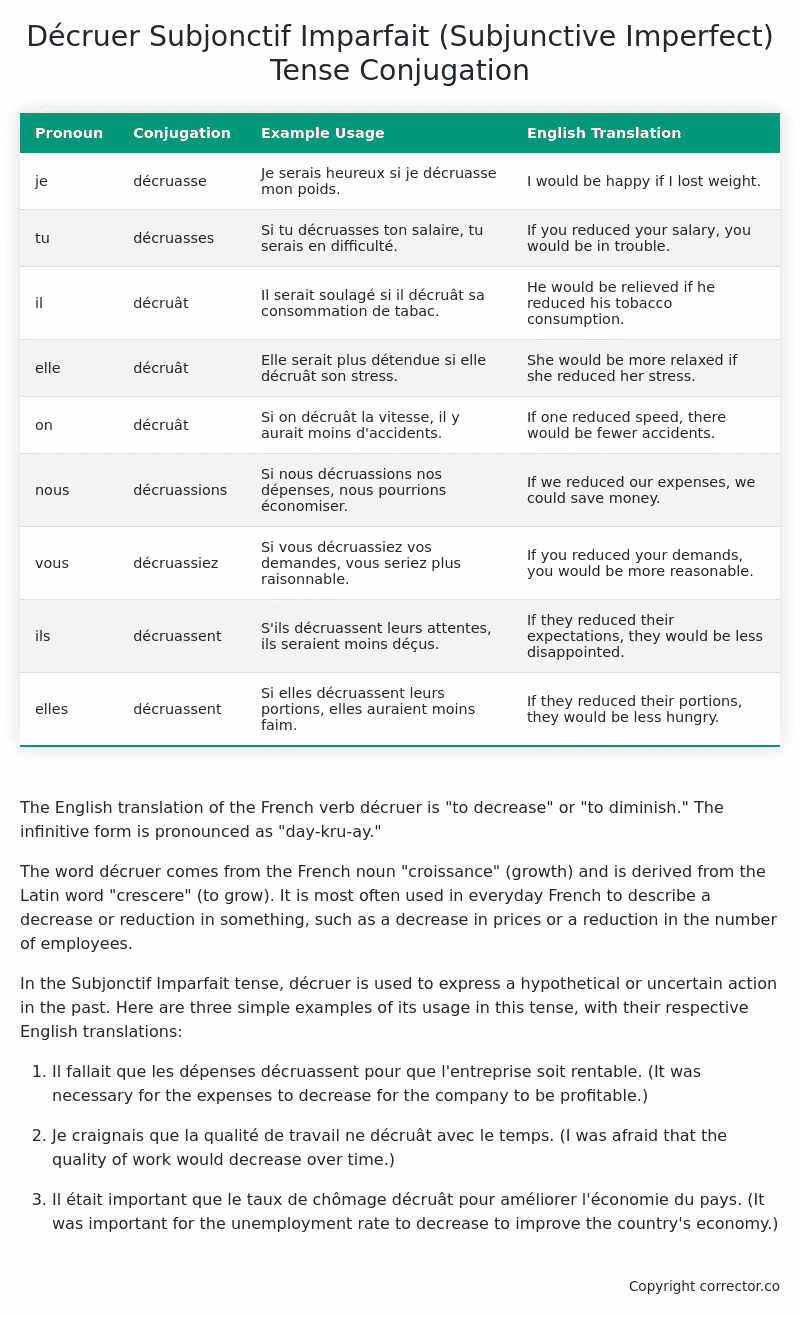Subjonctif Imparfait (Subjunctive Imperfect) Tense Conjugation of the French Verb décruer
Introduction to the verb décruer
The English translation of the French verb décruer is “to decrease” or “to diminish.” The infinitive form is pronounced as “day-kru-ay.”
The word décruer comes from the French noun “croissance” (growth) and is derived from the Latin word “crescere” (to grow). It is most often used in everyday French to describe a decrease or reduction in something, such as a decrease in prices or a reduction in the number of employees.
In the Subjonctif Imparfait tense, décruer is used to express a hypothetical or uncertain action in the past. Here are three simple examples of its usage in this tense, with their respective English translations:
-
Il fallait que les dépenses décruassent pour que l’entreprise soit rentable.
(It was necessary for the expenses to decrease for the company to be profitable.) -
Je craignais que la qualité de travail ne décruât avec le temps.
(I was afraid that the quality of work would decrease over time.) -
Il était important que le taux de chômage décruât pour améliorer l’économie du pays.
(It was important for the unemployment rate to decrease to improve the country’s economy.)
Table of the Subjonctif Imparfait (Subjunctive Imperfect) Tense Conjugation of décruer
| Pronoun | Conjugation | Example Usage | English Translation |
|---|---|---|---|
| je | décruasse | Je serais heureux si je décruasse mon poids. | I would be happy if I lost weight. |
| tu | décruasses | Si tu décruasses ton salaire, tu serais en difficulté. | If you reduced your salary, you would be in trouble. |
| il | décruât | Il serait soulagé si il décruât sa consommation de tabac. | He would be relieved if he reduced his tobacco consumption. |
| elle | décruât | Elle serait plus détendue si elle décruât son stress. | She would be more relaxed if she reduced her stress. |
| on | décruât | Si on décruât la vitesse, il y aurait moins d’accidents. | If one reduced speed, there would be fewer accidents. |
| nous | décruassions | Si nous décruassions nos dépenses, nous pourrions économiser. | If we reduced our expenses, we could save money. |
| vous | décruassiez | Si vous décruassiez vos demandes, vous seriez plus raisonnable. | If you reduced your demands, you would be more reasonable. |
| ils | décruassent | S’ils décruassent leurs attentes, ils seraient moins déçus. | If they reduced their expectations, they would be less disappointed. |
| elles | décruassent | Si elles décruassent leurs portions, elles auraient moins faim. | If they reduced their portions, they would be less hungry. |
Other Conjugations for Décruer.
Le Present (Present Tense) Conjugation of the French Verb décruer
Imparfait (Imperfect) Tense Conjugation of the French Verb décruer
Passé Simple (Simple Past) Tense Conjugation of the French Verb décruer
Passé Composé (Present Perfect) Tense Conjugation of the French Verb décruer
Futur Simple (Simple Future) Tense Conjugation of the French Verb décruer
Futur Proche (Near Future) Tense Conjugation of the French Verb décruer
Plus-que-parfait (Pluperfect) Tense Conjugation of the French Verb décruer
Passé Antérieur (Past Anterior) Tense Conjugation of the French Verb décruer
Futur Antérieur (Future Anterior) Tense Conjugation of the French Verb décruer
Subjonctif Présent (Subjunctive Present) Tense Conjugation of the French Verb décruer
Subjonctif Passé (Subjunctive Past) Tense Conjugation of the French Verb décruer
Subjonctif Imparfait (Subjunctive Imperfect) Tense Conjugation of the French Verb décruer (this article)
Subjonctif Plus-que-parfait (Subjunctive Pluperfect) Tense Conjugation of the French Verb décruer
Conditionnel Présent (Conditional Present) Tense Conjugation of the French Verb décruer
Conditionnel Passé (Conditional Past) Tense Conjugation of the French Verb décruer
L’impératif Présent (Imperative Present) Tense Conjugation of the French Verb décruer
L’infinitif Présent (Infinitive Present) Tense Conjugation of the French Verb décruer
Struggling with French verbs or the language in general? Why not use our free French Grammar Checker – no registration required!
Get a FREE Download Study Sheet of this Conjugation 🔥
Simply right click the image below, click “save image” and get your free reference for the décruer Subjonctif Imparfait tense conjugation!

Décruer – About the French Subjonctif Imparfait (Subjunctive Imperfect) Tense
Formation
Common Everyday Usage Patterns
Interactions with Other Tenses
Subjonctif Présent
Indicatif Passé Composé
Conditional
Conditional Perfect
Summary
I hope you enjoyed this article on the verb décruer. Still in a learning mood? Check out another TOTALLY random French verb conjugation!


